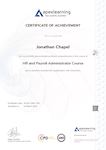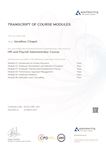Sage Training Courses
Flash Sale Now On | 11-in-1 Bundle | CPD Certified | 110 CPD Points | Gifts: Hardcopy + PDF Certificate + SID-Worth 180
Apex Learning
Summary
- Certificate of completion - Free
- Exam(s) / assessment(s) is included in price
- Tutor is available to students
Add to basket or enquire
Overview
Give a compliment to your career and take it to the next level. This Sage Training bundle will provide you with the essential knowledge to shine in your professional career. Whether you want to develop skills for your next job or elevate your skills for your next promotion, this Sage Training bundle will help you stay ahead of the pack.
Throughout the Sage Training programme, it stresses how to improve your competency as a person in your chosen field while also outlining essential career insights in the relevant job sector.
Along with this Sage Training course, you will get 10 premium courses, an original hardcopy, 11 PDF certificates (Main Course + Additional Courses) Student ID card as gifts.
This Sage Training Bundle Consists of the following Premium courses:
- ⇒ Course 01: Diploma in Sage 50 Accounts
- ⇒ Course 02: Accountancy
- ⇒ Course 03: Level 3 Xero Training
- ⇒ Course 04: Management Accounting Tools
- ⇒ Course 05: Level 3 Tax Accounting
- ⇒ Course 06: Business Analysis Level 3
- ⇒ Course 07: Team Management
- ⇒ Course 08: Corporate Finance: Working Capital Management
- ⇒ Course 09: Certificate in Anti-Money Laundering (AML)
- ⇒ Course 10: Financial Modelling Course - Learn Online
- ⇒ Course 11: Budgeting and Forecasting
Enrol now in Sage Training to advance your career, and use the premium study materials from Apex Learning.
How will I get my Certificate?
After successfully completing the course, you will be able to order your CPD Accredited Certificates (PDF + Hard Copy) as proof of your achievement.
- ➽ PDF Certificate: Free (Previously it was £10 * 11 = £110)
- ➽ Hard Copy Certificate: Free (For The Title Course)
PS The delivery charge inside the UK is £3.99, and international students have to pay £9.99.
Certificates
Certificate of completion
Digital certificate - Included
CPD
Course media
Description
The bundle incorporates basic to advanced level skills to shed some light on your way and boost your career. Hence, you can strengthen your Sage Training expertise and essential knowledge, which will assist you in reaching your goal. Moreover, you can learn from any place in your own time without travelling for classes.
Curriculum of Bundle
⇒ Course 01: Diploma in Sage 50 Accounts
- Sage 50 Bookkeeper – Coursebook
- Introduction and TASK 1
- TASK 2 Setting up the System
- TASK 3 a Setting up Customers and Suppliers
- TASK 3 b Creating Projects
- TASK 3 c Supplier Invoice and Credit Note
- TASK 3 d Customer Invoice and Credit Note
- TASK 4 Fixed Assets
- TASK 5 a and b Bank Payment and Transfer
- TASK 5 c and d Supplier and Customer Payments and DD STO
- TASK 6 Petty Cash
- TASK 7 a Bank Reconnciliation Current Account
- TASK 7 b Bank Reconciliation Petty Cash
- TASK 7 c Reconciliation of Credit Card Account
- TASK 8 Aged Reports
- TASK 9 a Payroll
- TASK 9 b Payroll
- TASK 10 Value Added Tax – Vat Return
- Task 11 Entering opening balances on Sage 50
- TASK 12 a Year end journals – Depre journal
- TASK 12 b Prepayment and Deferred Income Journals
- TASK 13 a Budget
- TASK 13 b Intro to Cash flow and Sage Report Design
- TASK 13 c Preparation of Accountants Report & correcting Errors (1)
⇒ Course 02: Accountancy
- Module 01: Introduction to Accounting
- Module 02: The Role of an Accountant
- Module 03: Accounting Concepts and Standards
- Module 04: Double-Entry Bookkeeping
- Module 05: Balance Sheet
- Module 06: Income statement
- Module 07: Financial statements
- Module 08: Cash Flow Statements
- Module 09: Understanding Profit and Loss Statement
- Module 10: Financial Budgeting and Planning
- Module 11: Auditing
⇒ Course 03: Level 3 Xero Training
- Introduction
- Getting Started
- Invoices and Sales
- Bills and Purchases
- Bank Accounts
- Products and Services
- Fixed Assets
- Payroll
- VAT Returns
⇒ Course 04: Management Accounting Tools
- Module 01: Introduction to Management Account
- Module 02: Manufacturing Costs and Financial Statements
- Module 03: Traditional Costing System – Job and Process
- Module 04: Activity Based Costing System
- Module 05: Activity Based Management
- Module 06: Cost Behaviour and the Contribution Margin
- Module 07: Cost Volume Profit
- Module 08: Cost Volume Profit Analysis
- Module 09: Incremental Analysis in Decision Making
- Module 10: Budget Planning
- Module 11: Budget Control And Responsibility Accounting
- Module 12: Control Using Standard Costs and the Balanced Scorecard
- Downloadable Resources
⇒ Course 05: Level 3 Tax Accounting
- Module 01: Tax System and Administration in the UK
- Module 02: Tax on Individuals
- Module 03: National Insurance
- Module 04: How to Submit a Self-Assessment Tax Return
- Module 05: Fundamentals of Income Tax
- Module 06: Advanced Income Tax
- Module 07: Payee, Payroll and Wages
- Module 08: Capital Gain Tax
- Module 09: Value Added Tax
- Module 10: Import and Export
- Module 11: Corporation Tax
- Module 12: Inheritance Tax
- Module 13: Double Entry Accounting
- Module 14: Management Accounting and Financial Analysis
- Module 15: Career as a Tax Accountant in the UK
⇒ Course 06: Business Analysis Level 3
- Module 01: Introduction to Business Analysis
- Module 02: Business Processes
- Module 03: Business Analysis Planning and Monitoring
- Module 04: Strategic Analysis and Product Scope
- Module 05: Solution Evaluation
- Module 06: Investigation Techniques
- Module 07: Ratio Analysis
- Module 08: Stakeholder Analysis and Management
- Module 09: Process Improvement with Gap Analysis
- Module 10: Documenting and Managing Requirements
- Module 11: Career Prospect as a Business Analyst in the UK
⇒ Course 07: Presenting Financial Information
- Module 01: Presenting Financial Information
- Module 02: The Hierarchy of Performance Indicators
- Module 03: The Principle of Effective Reports
- Module 04: Guidelines for Designing Management Reports
- Module 05: Methods of Presenting Performance Data
- Module 06: The Control Chart: Highlighting the Variation in the Data
- Module 07: The Pareto Chart: Highlighting Priorities
- Module 08: Exercise: The Control Chart
- Module 09: An Example Management Report
- Module 10: Interpreting Performance Data
- Module 11: Supporting Colleagues by Giving Feedback
- Module 12: Data Visualisation Part 01
- Module 13: Data Visualisation Part 02
- Module 14: Data Visualisation Part 03
- Module 15: Data Visualisation Part 04
- Module 16: Final Thoughts on Presenting Financial Information
⇒ Course 08: Corporate Finance: Working Capital Management
- Module 01: Course Introduction
- Module 02: Introduction to Working Capital Management
- Module 03: Trade Credit and Receivable Management
- Module 04: Payables Management
- Module 05: Inventory Management Practices
- Module 06: Cash Management Practice
⇒ Course 09: Certificate in Anti Money Laundering (AML)
- Module 01: Introduction to Money Laundering
- Module 02: Proceeds of Crime Act 2002
- Module 03: Development of Anti-Money Laundering Regulation
- Module 04: Responsibility of the Money Laundering Reporting Office
- Module 05: Risk-based Approach
- Module 06: Customer Due Diligence
- Module 07: Record Keeping
- Module 08: Suspicious Conduct and Transactions
- Module 09: Awareness and Training
⇒ Course 10: Financial Modelling Course - Learn Online
- Module 01: Basic Financial Calculations
- Module 02: Overview of Financial Markets, Financial Assets, and Market Participants
- Module 03: Financial Statement Modelling
- Module 04: Types of Financial Models
- Module 05: Sensitivity Analysis
- Module 06: Sales and Revenue Model
- Module 07: Cost of Goods Sold and Inventory Model
- Module 08: Valuation Methods
⇒ Course 11: Budgeting and Forecasting
- Unit-1. Introduction
- Unit-2. Detail Budget Requirement
- Unit-3. Process of Making Budget
Who is this course for?
Anyone from any background can enrol in this Sage Training bundle.
Requirements
This Sage Training course has been designed to be fully compatible with tablets and smartphones.
Career path
Having this expertise will increase the value of your CV and open you up to multiple job sectors.
Questions and answers
Hi. Do i need any software on my laptop to carry out this training? How does it look like? Is it just a video watching? Best regards
Answer:Hello Irina, You need the following software to do the bundle course: 1. Sage 50 Cloud Account, 2. Xero. This bundle course includes both the instructor's video courses and the voice-over courses.
This was helpful.
Reviews
Currently there are no reviews for this course. Be the first to leave a review.
Legal information
This course is advertised on reed.co.uk by the Course Provider, whose terms and conditions apply. Purchases are made directly from the Course Provider, and as such, content and materials are supplied by the Course Provider directly. Reed is acting as agent and not reseller in relation to this course. Reed's only responsibility is to facilitate your payment for the course. It is your responsibility to review and agree to the Course Provider's terms and conditions and satisfy yourself as to the suitability of the course you intend to purchase. Reed will not have any responsibility for the content of the course and/or associated materials.







